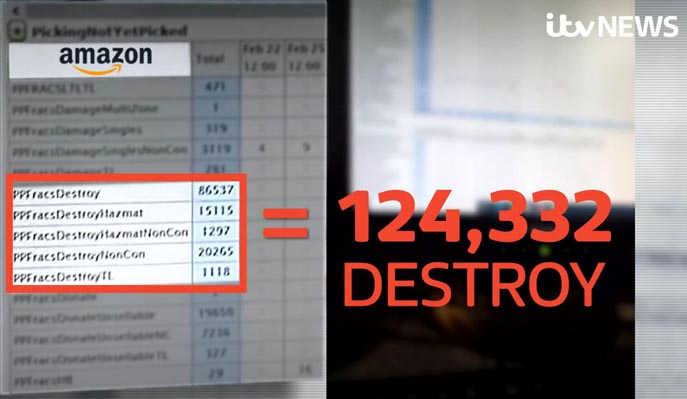In his monthly column, Oliver Balch reports on the importance of ‘walking the talk’ on sustainability commitments, a breakthrough in recycling plastic, and a drive to nudge SMEs towards net zero
News that online retail giant Amazon is in the habit of bundling tonnes and tonnes of unsold stock into boxes labelled “destroy” in its warehouses is disappointing, to put it mildly. “Something is fundamentally wrong,” tweeted the environmental campaigner Greta Thunberg.
Yet this was the finding from investigative research by UK broadcaster ITV, which followed lorries carrying unsold goods from its giant Dunfermline warehouse in Scotland to waste management centres and landfill sites. An ex-employee at one warehouse, who asked for anonymity, said: “From a Friday to a Friday our target was to generally destroy 130,000 items a week.” He claimed that half were unopened and still in their shrink wrap packaging and only a small fraction were instead donated to charity.
In its response, the company said: “We are working towards a goal of zero product disposal and our priority is to resell, donate to charitable organisations or recycle any unsold products. No items are sent to landfill in the UK. As a last resort, we will send items to energy recovery, but we’re working hard to drive the number of times this happens down to zero.” For “energy recovery” read “incineration”.
Amazon does indeed have resale sites and offers used products alongside new on its website, but with 130,000 items a week reportedly disposed of from one single warehouse, you have to ask how genuine its efforts at promoting circularity really are.

So, what does the incident teach us? First, that the old chestnut of “walking the talk” remains as true as ever. Amazon has made huge play around its environmental ambitions in recent years, particularly around energy use. Only in May, it issued a $1bn sustainability bond to acquire e-vehicles and construct net-zero buildings, among other eco-ends.
Yet for a fourth consecutive year in 2020, Amazon was one of 1,025 companies targeted by investors in CDP’s annual non-disclosure campaign, for refusing to respond to requests for more transparency on reporting its action on climate change and deforestation risk (See also Insurers and airlines begin to feel the heat over climate risk).
And such reports also risk fuelling the scepticism of an already sceptical public. A new global survey by PR giants FleishmanHillard, reveal that more than half (55%) of consumers think companies aren’t really committed to doing the right thing – however slick their ads and glossy their marketing.
Amazon has proven it has the wit to sell more or less anything
Of all the retailers on the planet, Amazon has proven it has the wit to sell more or less anything.
Sure, a slightly dented chair or an unwanted football might take more imagination than flogging the latest iPhone, but it’s infinitely doable. Indeed, with consumer attitudes towards conscious consumption inching up all the time (see Accenture’s Consumer Pulse research), the door is half ajar already.
Amazon's shortcomings on circularity look particularly stark compared with the efforts of other big brands.
As we were going to press, there was news that green biotech company Carbios, working with a consortium of companies including L’Oréal, Nestlé Waters, PepsiCo and Suntory Beverage & Food Europe, has produced the world’s first PET bottles made entirely from enzymatically recycled plastic.

The new Carbios PET technology upcycles any PET plastic (including textiles) to 100% food-grade quality, something that current recycling can not do, with a quarter fewer carbon emissions than PET bottles from fossil fuels.
It comes amid news that sales of plastic water bottles have increased by 12% in the UK over the last five years.
Unilever, meanwhile, is to extend a refillable packaging trial in selected Asda and Co-op convenience stores in the UK. Likewise, beer brand Corona’s new Plastic Reality initiative, which helps consumers visualise their plastic usage over a whole year, answers the call to educate, educate, educate.
There was also welcome news of a four-pillar Plastics Pact among the U.S. plastic industry (including a pledge to “effectively” recycle or compost half of all plastic by 2025) and a tentative stab at mapping a circular transition for the shipping sector.
Brand creativity also involves thinking inventively about end-of-use phase
Meanwhile one of the strap lines of a new campaign by German appliance maker Miele - “Longevity is the ultimate sustainability” - should be adopted by every consumer brand.
Made, the online homeware brand, recently teamed up with the French-based giving platform Geev to enable customers on its UK website to post for free any unwanted household items (whether Made products or not) that they want to give away.
To incentivise participation, the online retailer is promising to donate to charity 10% of whatever customers end up spending on its online store. The move follows a similar buy-back scheme by retail giant IKEA, with UK customers now able to browse second-hand goods either in store or via a tie-up with re-commerce platform Gumtree (by typing #CircularHub into its search engine).
Amazon, a retailer that aspires to be the “Earth's most customer-centric company”, would do well to take note.
SMEs: a light on the little guys
The United Nation’s international summit on climate change is fast approaching. In what might be described as a regional warm-up, experts gathered on learned panels for London Climate Action Week. While it’s the big guns from the world of business, finance and public policy who occupy the main stage, awareness is growing that climate ambitions will only ever be met if the little guys get a look in, too.
In terms of civil society, that means you and me, the individual citizen. Welcome, therefore, is a new initiative from 11 global financial brands (including Chinese tech giant Ant Group, U.S. consumer finance firm Mastercard, and Spanish bank BBVA) to “catalyse green action” by one billion consumers between now and 2025.
The equivalent in business circles are the world’s 400 to 500 million small- and medium-sized enterprises (SMEs). Often described as the “backbone” of the world economy, SMEs (variously defined as companies with 250-500 employees or fewer) comprise 99% of all businesses in the OECD’s 37 countries, and generate up to 60% of all value added (through wages, profits, taxes, as so on) in high-income countries. They also make up a hefty chunk of industrial emissions – although the question of precisely how much has been given “little consideration”, to quote the Canadian consultancy WSP (note: SMEs represent 12% of the Global Reporting Initiative’s Sustainability Disclosure Database).

The UK is calling on its 6m SMEs to halve their emissions by 2030. (Credit: M_Agency/Shutterstock)
Fortunately, attention in climate quarters seems to be turning their way. Many of the recent, big-ticket interventions are coming from government quarters – often with a direct or indirect tie-in to Covid recovery measures. Cash from the Mayor of London’s Green New Deal fund, for example, has found its way into a new grant scheme by the government-backed, anti-waste group ReLondon to support low-carbon, circular-economy measures by SMEs based in the UK capital.
Similarly, the United Nations-supported SME Climate Hub, part of the UN’s Race to Zero campaign, is partnering with the UK government in its new call for the country’s 6m SMEs to halve their emissions by 2030. The ultimate goal of the newly launched Together for our Planet Business Climate Leaders’ campaign is for SMEs to cut their emissions to net zero by 2050. Time is short, however. With just five months until COP26 in Glasgow, the hub has attracted endorsements from a mere 1,200 SMEs around the world.
Yet, while 91% of SME owners say they care about sustainability, according to a new survey by UK bank Lloyds, immediate tasks such as meeting orders and paying the wage bill tend to occupy the bulk of their attention. Little wonder they have only sketchy plans at best for mitigating their climate impact (47% of small SMEs have no commitment to net zero or any intention to commit in the future).
Nearly half of the 400 multinational companies surveyed are helping suppliers invest in clean tech solutions
News that almost eight in 10 (78%) of large companies might start culling their “slow-to-transition” suppliers may well act as a “wake up call”, to quote a representative of Standard Chartered bank, which commissioned the research behind the finding. Fortunately, the threat of cancelled contracts isn’t their only ploy. Nearly half (46%) of the 400 multinational companies surveyed are helping suppliers invest in clean tech solutions, for instance, while over a third (37%) are passing on advice about energy-saving.
SME-oriented toolkits for reaching net zero, like the free online resource recently developed by education charity Edinburgh Science, are all grist to this knowledge-building mill. As are efforts to champion those leading the charge, most of which (because they are small and have minimal marketing budgets) pass without note. So, for instance, the fact that UK county of Surrey now has a sustainability-specific awards event for local SMEs is important.
Will such measures individually make a difference? Not in the grand scheme of things, perhaps. But then SMEs don’t deal in grand schemes. Getting on with things is their speciality, often with huge creativity and imagination. Excite and incentivise the world’s half-a-billon SMEs about a low-carbon future and it won’t matter what the expert panellists choose to call it. Net zero, carbon neutral or whatever, we’ll be a good deal closer to achieving the UN’s climate ambitions than we are now
This article is part of the July issue of the Sustainable Business Review. See also:
Policy Watch: ‘Slow and timid UK’ needs to focus on delivery, not promises, warn climate advisors
ESG Watch: Insurers and airlines begin to feel the heat over climate risk
Can Big Ag turn from climate crisis villain to sustainability paragon?
Why Tesla now has Volkswagen and other auto majors in its rear-view mirror


